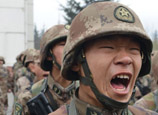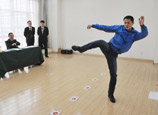
BEIJING, March 19 (Xinhua) -- New research has indicated that fighting corruption was the public's biggest concern out of all the issues discussed during China's just-concluded annual political sessions.
According to a poll conducted by the China Youth Daily and released on Tuesday, 53 percent of the 8,205 people surveyed paid greatest attention to anti-graft issues while following the sessions.
China's new leadership has adopted an unusual tough tone in pinpointing the urgency of fighting corruption.
When China's parliament concluded its annual session on Sunday, Xi Jinping used his first public speech as Chinese president to reiterate that the Communist Party of China (CPC) will "unswervingly fight against any negative and corruptive phenomenon."
The remarks echoed the vivid language used to show his anti-corruption resolve in January, when he suggested that China should "swat 'tigers' and 'flies' at the same time by dealing with illegal activities of officials on the one hand and tackling malpractices and corruption cases, which closely impact the people, on the other."
The poll results indicate the tough task ahead for the CPC because, as Zheng Gongcheng, a social security professor with Renmin University of China says, they expose the perceived rampant nature of Chinese corruption.
"The CPC has a strong sense of crisis. It has realized corruption is a severe challenge in its governing position," added Huang Renwei, vice president of the Shanghai Academy of Social Sciences.
There are other areas of focus for the public, according to the research. It showed that their second-biggest concern is "income distribution," with 52.5 percent of those surveyed making this response to the poll. Food safety and price issues were the third and fourth-hottest issues.
Among the numerous proposals and bills put forward by legislators and advisors at the sessions, online game guru Chen Tianqiao's proposal on promoting medical care reform and raising doctors' salaries was the most popular among tho people quizzed by China Youth Daily.
A bill on taking pollution treatment into account while assessing officials' performance and one proposing an "old cellphones for new" program ranked the second and third-most popular, respectively.
"These proposals and bills became popular because they were all related to people's well-being, and responded to common people's concerns," said Zheng.
Of the people surveyed, 88 percent were satisfied with the proposals and bills introduced by deputies to the National People's Congress (NPC), the top legislature, and members of the National Committee of the Chinese People's Political Consultative Conference, the top advisory body.
But some responses urged legislators and advisors to communicate more with the grass-roots and let people's true voices be heard.
"I don't even know who was representing me and how to get in contact with them," said a respondent surnamed Xu.
"No inquiry, no say," said Zheng, who is also an NPC deputy. He said issues of great concern to the general public must be the focus of the people's representatives in legislative and advisory bodies.
He suggested legislators and advisors do more field research and listen to different opinions from members of the public so that they can submit more feasible proposals.
















 Seeking a dream wedding at Beijing Wedding Expo
Seeking a dream wedding at Beijing Wedding Expo


![]()
